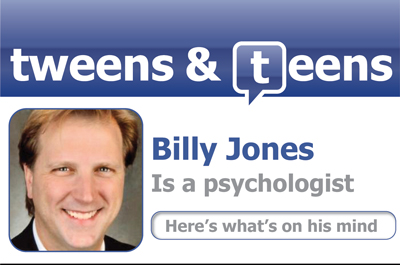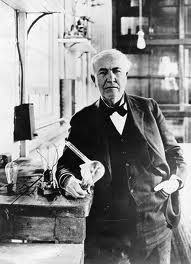
“I was trying to daydream, but my mind kept wandering.” — Steven Wright
Hello all and welcome to the February edition of Tweens & Teens.
ADHD is a hot topic these days, but, in my professional opinion, the disorder is over diagnosed. Don’t get me wrong, it’s a very real concern for many people, but it’s over diagnosed — primarily because many of the symptoms are also found in other disorders. Go down the “ADHD checklist”, and you’ll see what I mean. It’s estimated that about 3%-5% of the population actually have ADHD, though everywhere you turn, it seems that somebody has been diagnosed. So, let’s try to dive into this a bit further and see what’s really going on.
What is it?
Parents need to understand the basics about this disorder, so let’s start with something a lot of people don’t know – the diagnosis is now  referred to only as “ADHD”. ADD is an old term and still used, though TECHNICALLY it is all ADHD; however, there are three subtypes of ADHD:
referred to only as “ADHD”. ADD is an old term and still used, though TECHNICALLY it is all ADHD; however, there are three subtypes of ADHD:
(1) ADHD-Predominantly Inattentive Type (this used to be called ADD)
(2) ADHD-Predominantly Hyperactive-Impulsive Type
(3) ADHD-Combined Type (which is a combination of the first two)
Here’s a link to the Mayo Clinic which helps illustrate some of the symptoms for each of these subtypes: http://www.mayoclinic.com/health/adhd/DS00275/DSECTION=symptoms
What causes it?
ADHD results from neurological factors, but genetics also play a part. It is believed to occur because certain chemicals in your brain (called neurotransmitters) are not working efficiently. There are two neurotransmitters which are particularly important — Dopamine and Norepinephrine.
Inattention and distractibility (i.e., ADHD-Predominantly Inattentive Type) appear related to low levels of Norepinephrine. Low levels of Norepinephrine make it hard for ADHD children (and adults) to sustain focus on tasks, plan ahead, sequence appropriately, and demonstrate effective time management skills.
Impulse and hyperactive problems appear related to low levels of Dopamine (i.e., ADHD-Predominantly Hyperactive-Impulsive Type). When dopamine levels are abnormal, we find it hard to repress urges to do or say something in public, often blurt out responses, fidget, and get up out of our seat at the wrong time.
Obviously, low levels of both Norepinephrine and Dopamine are indicative of ADHD-Combined Type.
Genetically, if one parent has ADHD, there is an approximate 25% chance that their child will have it. If both parents have been diagnosed, there’s a 60% chance their child will have it.
How is it treated?
There are several ways to treat ADHD, though none are more popular than medication. Medications effective for ADHD alter levels of Dopamine and Norepinephrine, especially a class known as stimulants. Stimulate medications include Ritalin, Concerta, Adderall, Focalin (as well as several others) and are known to increase the production of these two neurotransmitters. Research has shown them to be effective approximately 70%-80% of the time.
When neurotransmitters are effectively managed, areas in our brain can develop more easily. The majority of areas impaired by ADHD are known as “executive functions” and include planning ahead, regulating your emotions, sequencing appropriately, managing your time effectively, problem-solving, and analyzing behaviors. This is by no means a complete list, but you get the idea.
Let’s be clear though, neurotransmitters (as well as medications that increase their production) do NOT give you skills. They only allow your behavior to be controlled to the point that appropriate skills can develop more naturally.
Also, too high of a dosage will “over-stimulate” the brain and give you that “zombie” look. This is alleviated by lowering the dose.
To medicate or not to medicate?
I also want to make something else ABSOLUTELY CLEAR. Medication is not always the answer and I try very hard to avoid recommending medication, if possible. Medication should always be used as a last resort.
There are other methods that help, including behavior modification programs and counseling to address poor executive functioning skills. Social skills are often included in counseling as peer relationships can be difficult for the ADHD child.
Though many people would disagree, I have not found herbal medications to be helpful for ADHD.
How is it diagnosed?
Dr. Russell Barkley has developed a theory about ADHD that describes it as a neurodevelopmental disorder that adversely impacts several areas, primarily executive functioning and behavior inhibition (obviously there is WAY more than that, but this is simplest way I can put it). Since I believe in his theory, I buy tests that measure areas of the brain that involve executive functions.
If you have ADHD symptoms AND executive functioning skills are impaired, then I feel pretty confident that a diagnosis should be considered.
If you have ADHD symptoms, but executive functioning is NOT impaired, then I say, “I believe you. You have trouble concentrating, focusing, etc. BUT…it is not ADHD. It is something else that is mimicking ADHD (usually anxiety, but it can also be other things such as dyslexia, etc.).”
Your medical doctor can also diagnose ADHD, but they do not usually do a complete psychological evaluation. They will likely use checklists obtained from the parents and teacher(s) as well as observations of the child. If enough symptoms are found to be present, then a diagnosis can be made.
What goes with it?
Many times, ADHD is not the only diagnosis assigned. There are oftentimes “comorbid”, or co-existing disorders that are diagnosed in addition to ADHD. Here are some of the more common comorbid disorders and the approximate percentage of times they are diagnosed with ADHD:
1. Oppositional Defiant Disorder (ODD) = 60% of the time
2. Conduct Disorder = 40%
3. Depression or Anxiety = 25%
4. Reading Disability (dyslexia) = 20%
5. Math Disability (dyscalculia) = 20%
6. Writing Disability (i.e., dysgraphia) = 15%
FYI…Oppositional Defiant Disorder and Conduct Disorder are more likely to be diagnosed with ADHD-Combined Type, while Anxiety and Depression are more likely to be diagnosed with ADHD-Predominantly Inattentive Type.
Who else has it?
Although ADHD is a serious disorder, having it does not necessarily limit a child’s potential or future achievements, as evidenced by the list below. I was looking online and found a list of famous people who have either been diagnosed, or been suspected of having, ADHD. Obviously people who lived a long time ago weren’t officially diagnosed that way, but their history suggests they might have had ADHD. I think you’ll recognize these names and see that they were able to accomplish some pretty wonderful things.
Alexander Graham Bell — Telephone Inventor

Jim Carrey — Comedian
Sir Winston Churchill — English Statesman (Failed the sixth grade)
Bill Cosby — Actor, Comedian
Walt Disney — Cartoonist (A newspaper editor fired him because he had “No good ideas”.)
Thomas Edison — Inventor (His teachers told him he was too stupid to learn anything)
Albert Einstein — Physicist (Einstein was four years old before he could speak, and seven before he could read)
Dwight D. Eisenhower — U. S. President, Military General
Henry Ford — Automobile Innovator, invented the Production Line
Whoopi Goldberg — Comedienne, Actress
Michael Jordan — Basketball Player
Wolfgang Amadeus Mozart — Composer
Napoleon Bonaparte —Emperor of France
Babe Ruth — Baseball Player
Steven Spielberg — Filmmaker
Robin Williams — Comedian, Actor
Henry Winkler – Actor (he played Fonzie on Happy Days)
Wrap Up Time…
Well, there you have it. Whew! I’ll tell you that this is a complicated disorder, and there are many schools of thought and theories on it. The one I’ve presented here is only one, though obviously it’s the one I believe. I have also met people who do not believe that ADHD is a real disorder. As you can guess, I completely disagree with that school of thought.
One more thing: Adults can have ADHD, though it’s usually the Inattentive subtype. Hyperactivity and impulsivity related to ADHD typically decrease around puberty. As such, some children diagnosed with ADHD-Combined Type are re-diagnosed as ADHD-Predominantly Inattentive Type as an adult.
AND…you cannot suddenly develop ADHD as an adult. If you have it as an adult, you had it as a child. You just found ways to compensate for your areas of weakness or, in some cases, this was not addressed with your doctor and you essentially went undiagnosed. I see this with college freshman who were able to “breeze” through school because they were smart enough to compensate and make decent grades. Then, when they got to college, they found out they really didn’t know how to organize, study, etc. and end up getting an evaluation or going to see their physician.
I hope this helps, and I’ll see you next month.
billy
Click here to read previous articles on Tweens & Teens. Got a question for Dr. Jones, a child psychologist for Mercy Health? Send it to us (we won’t use your name) and we may feature it in an upcoming installment of Tweens & Teens.

